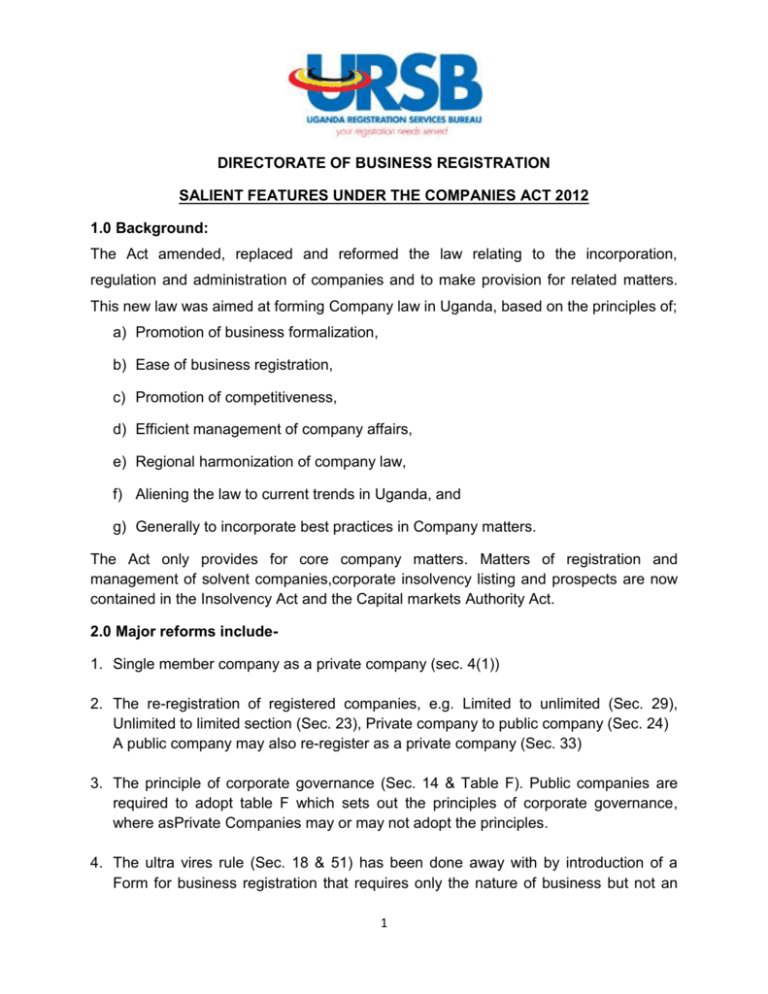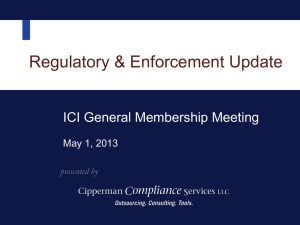the companies act 2012- salient features
advertisement

DIRECTORATE OF BUSINESS REGISTRATION SALIENT FEATURES UNDER THE COMPANIES ACT 2012 1.0 Background: The Act amended, replaced and reformed the law relating to the incorporation, regulation and administration of companies and to make provision for related matters. This new law was aimed at forming Company law in Uganda, based on the principles of; a) Promotion of business formalization, b) Ease of business registration, c) Promotion of competitiveness, d) Efficient management of company affairs, e) Regional harmonization of company law, f) Aliening the law to current trends in Uganda, and g) Generally to incorporate best practices in Company matters. The Act only provides for core company matters. Matters of registration and management of solvent companies,corporate insolvency listing and prospects are now contained in the Insolvency Act and the Capital markets Authority Act. 2.0 Major reforms include1. Single member company as a private company (sec. 4(1)) 2. The re-registration of registered companies, e.g. Limited to unlimited (Sec. 29), Unlimited to limited section (Sec. 23), Private company to public company (Sec. 24) A public company may also re-register as a private company (Sec. 33) 3. The principle of corporate governance (Sec. 14 & Table F). Public companies are required to adopt table F which sets out the principles of corporate governance, where asPrivate Companies may or may not adopt the principles. 4. The ultra vires rule (Sec. 18 & 51) has been done away with by introduction of a Form for business registration that requires only the nature of business but not an 1 entire list of objectives. Hence, Companies are no longer limited by the stated objects. 5. 3rd Party dealings. See Sec. 53, 54.A person dealing with a company is not required to inquire into the capacity of the Company/ Directors (Sec. 53). Contracts which are purported to be made on behalf of the company have effect against the person purporting to act for the Company (Sec. 54) and a Company may adopt a pre-incorporation contract without novation. 6. A company is prohibited from giving financial assistance to any person or its subsidiary to purchase or subscribe for shares in its holding company (Sec. 63). However, Public & Private Companies may be allowed where net assets will not be reduced by the financial assistance (Sec. 64 & 65). This is intended to avoid fraud on the part of the person borrowing from the Company to acquire shares in the same Company. 7. Directors actions bind the company (Sec. 52) 8. On request by members of the company the registrar may appoint an inspector to inspect the affairs of the company (intended to reduce the time spent in court hearings). This may occur in cases where the affairs of the company are intended to defraud, there is misconduct in management or it isdesirable to conduct the investigation. Sec. 172. If deemed necessary, the Registrar may refer matters to DPP. 9. Minimum age of Director now at 18 years (Sec. 196) right from 21 years under cap 110. 10. The Act prohibits Public Companies from extending loans and guarantees to directors (Sec. 203), exception beingMoney lenders Companies which may give loans (Sec. 207). 11. A company is prohibited from any arrangement by which a director or a person connected to the director acquires non-cash assets (219 and 220) 12. The registrar given powers to hear complaints from oppressed minorities shareholders (Sec. 247). 13. Periodic Statements (Sec. 266). Applies to all Insurance companies whether registered in or outside Uganda. 14. The Act introduces strict director qualifications and disqualifications intended to ensure proper company management (sections 185, 195 to 201). Directors are given 2 strict duties to carry out in company management to ensure that companies do not collapse 15. The Act introduces Electronic filing of documents (Sec. 2 & 275). Anything required to be filled manually may be filled electronically as well. 16. The Act has revised the fines and penalties under the current companies Act by the use of fines in the new Act. It uses Currency points have (1st Schedule to the Act). 17. The Act introduces principles of Corporate Governance under Section 14. The Section refers to table F that incorporated principles of corporate governance whose purpose is to; • Act as a guide to proper management of the company affairs • Protect the different stakeholders in a company • Draw distinctions between the board and directors The table provides for the constitution of the Board of Directors (BOD), and antecedents thereto as follows: a. It is accountable for the performance and affairs of the company. They are expected to act in good faith with due diligence and care in the interest of the company b. The composition of the BOD provides for responsibilities to enable: • Provision of strategic direction • Retention of full and effective control • Monitor operation and performance of the company • Review major plans • Ensure transparency, and • Oversee major capital expenditures c. The BOD CompositionThe board should be composed of executive directors, andNon-executive directors d. Chairperson& Chief Executive Officer; 3 There has to be a division of responsibilities between the executive officer and the Board chairperson, the former being responsible for the evaluation of the performance of the chairman. e. Directors Executive directors are involved in the day to day running of the company and the secretary is charged with ensuring that new directors are brief on the regulations that regulate the company. f. Remuneration To maintain quality management sufficient remuneration should be provided to directors. The board should appoint a remuneration committee. g. Meetings of the BOD The board should meet at least once in three months, with a proper notice of the meeting served. h. Company Secretary The secretary has a role in ensuring that the company adheres to corporate governance principles. The secretary must therefore be a fit and proper person falling within the categories provided under the companies Act. End of document 4









